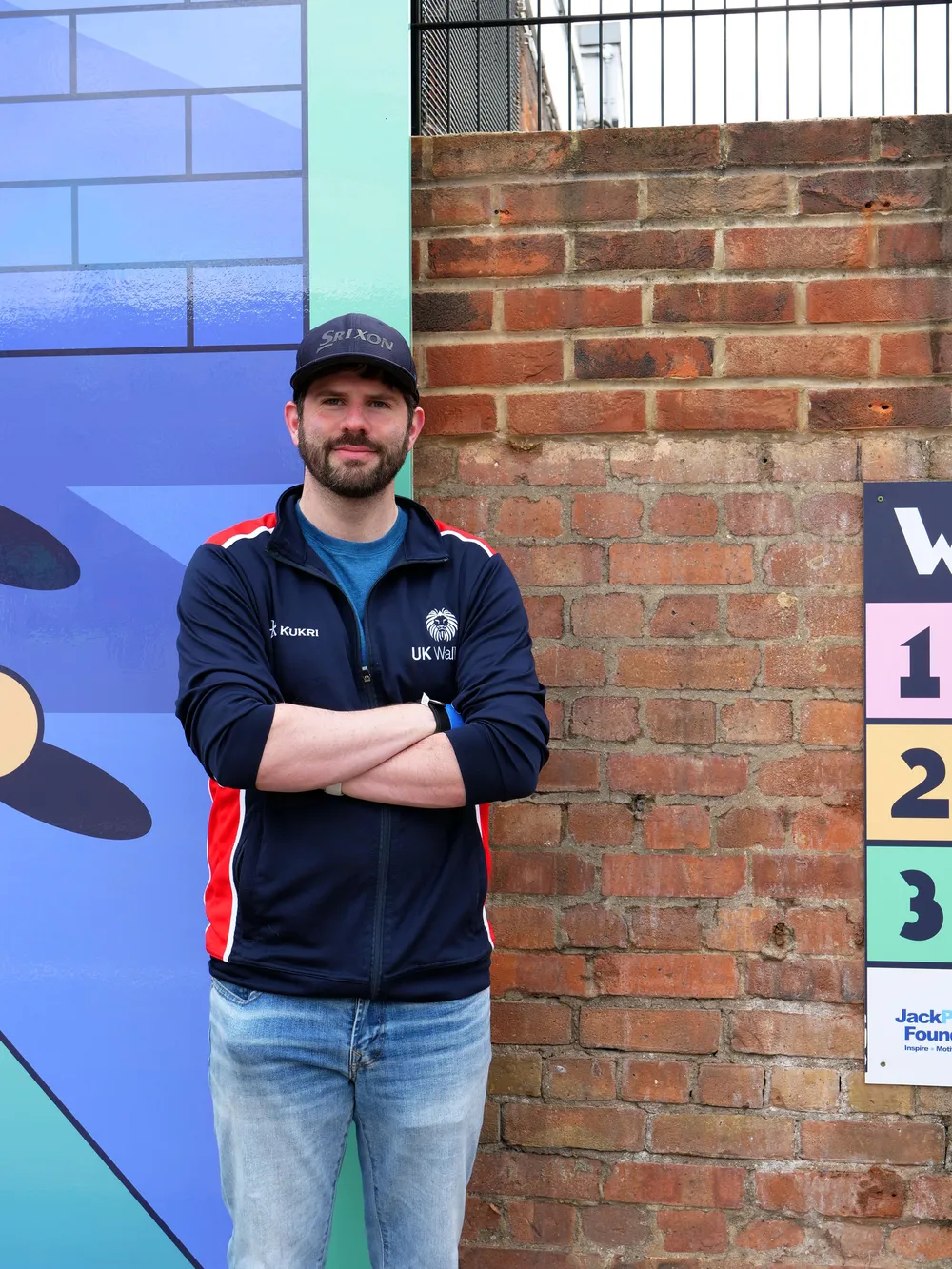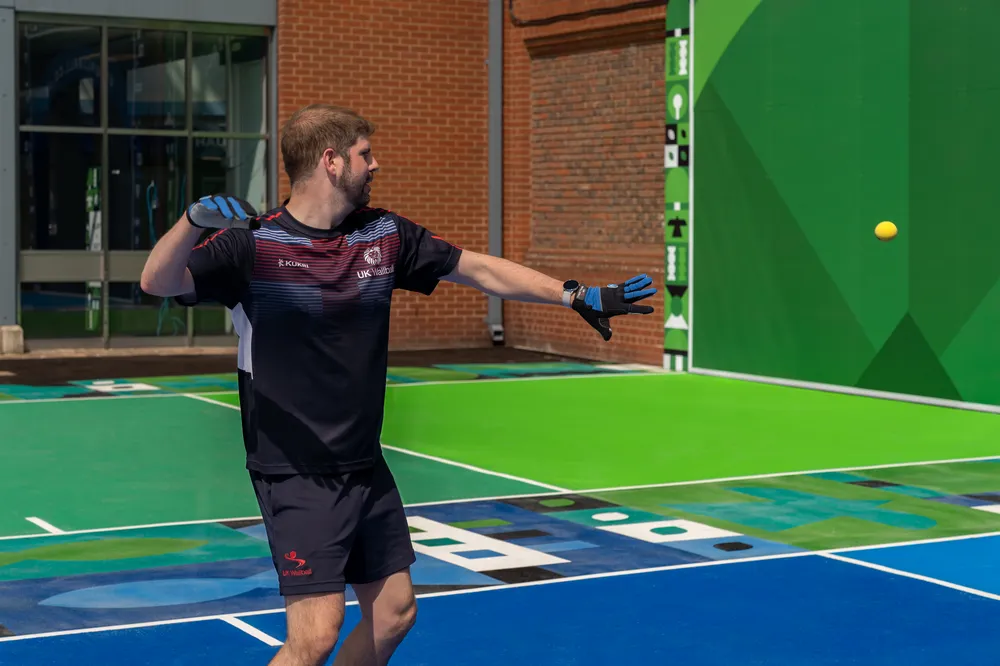Daniel Grant: 1-Wall Handball
Daniel Grant: 1-Wall Handball
Daniel Grant: 1-Wall Handball
Author
Most would agree that playing sport improves people’s physical and mental health, and social wellbeing. Yet, participation in grassroots sports is declining, while obesity and poor mental health is on the rise.
As a sportsman and a medic, Dr Daniel Grant has a unique insight into the link between physical activity and good health, and believes he may have a solution – 1-Wall Handball, which is a zero/low cost, accessible street game, with the added benefit of bringing communities together.
Daniel is a former top European player of 1-Wall Handball, which is akin to squash but without racquets, and played against a wall.
“I sit in the middle of this Venn diagram between sport and health, and I believe we have a solution with 1-Wall Handball. Our motto is any wall, any ball, any time. It’s accessible, inclusive, and free.”
It was to explore how he could promote 1-Wall Handball – also known as Wallball – that led to Daniel’s 2020 Churchill Fellowship.
As founder of 1Wall UK (previously known as the UK Wallball Association), Daniel wanted his Fellowship to help inform the development of this organisation.
Fellowship travels to the Americas
Daniel visited the USA, Mexico, Argentina, and Uruguay. He went first to New York, home of 1-Wall Handball, where there are 2,500 free-to-use outdoor courts.
“New York was really insightful, and you could see how the sport had grown over the last 50 years. The beauty is, this is on the doorstep, because courts are everywhere.”
On America’s West coast, Daniel observed how well the sport is marketed; in Mexico he saw how the athletes are celebrated in urban street art; and in Argentina, he noticed the game was being modified to encourage participation.
"I didn’t want to do things in the same way as other sports bodies, I wanted to be different, and seeing what is happening around the world has helped inform that strategy.”
Putting learning into practice
Because his Fellowship was awarded during Covid, Daniel has staggered his travels, completing his last trip in 2024. This has brought the advantage that Daniel has been able to put some of the learning into practice, while still carrying out his Fellowship.
Through the UK Wallball Association, a schools and communities programme is running, with over 50 London schools and many other schools and community locations playing 1-Wall Handball.
Daniel has devised a version for squash courts and is piloting this with a leisure group. Similarly, he is looking at creating a game which can be played at Padel clubs.
One project in Canada Water involved building courts in a redundant space. Sadly, these have since been knocked down, but the model of using a dead area in a non-traditional sporting space (it was on the side of a shopping centre), creating walls and courts, and adding in a ball vending machine is one which Daniel hopes to repeat in other locations.
Much of Daniel’s work is, he says, thanks to the Fellowship. “I wouldn’t have visited half these places without the Fellowship, or met half these people, or asked the right questions. I didn’t want to do things in the same way as other sports bodies, I wanted to be different, and seeing what is happening around the world has helped inform that strategy.”
As a sportsman and a medic, Dr Daniel Grant has a unique insight into the link between physical activity and good health, and believes he may have a solution – 1-Wall Handball, which is a zero/low cost, accessible street game, with the added benefit of bringing communities together.
Daniel is a former top European player of 1-Wall Handball, which is akin to squash but without racquets, and played against a wall.
“I sit in the middle of this Venn diagram between sport and health, and I believe we have a solution with 1-Wall Handball. Our motto is any wall, any ball, any time. It’s accessible, inclusive, and free.”
It was to explore how he could promote 1-Wall Handball – also known as Wallball – that led to Daniel’s 2020 Churchill Fellowship.
As founder of 1Wall UK (previously known as the UK Wallball Association), Daniel wanted his Fellowship to help inform the development of this organisation.
Fellowship travels to the Americas
Daniel visited the USA, Mexico, Argentina, and Uruguay. He went first to New York, home of 1-Wall Handball, where there are 2,500 free-to-use outdoor courts.
“New York was really insightful, and you could see how the sport had grown over the last 50 years. The beauty is, this is on the doorstep, because courts are everywhere.”
On America’s West coast, Daniel observed how well the sport is marketed; in Mexico he saw how the athletes are celebrated in urban street art; and in Argentina, he noticed the game was being modified to encourage participation.
"I didn’t want to do things in the same way as other sports bodies, I wanted to be different, and seeing what is happening around the world has helped inform that strategy.”
Putting learning into practice
Because his Fellowship was awarded during Covid, Daniel has staggered his travels, completing his last trip in 2024. This has brought the advantage that Daniel has been able to put some of the learning into practice, while still carrying out his Fellowship.
Through the UK Wallball Association, a schools and communities programme is running, with over 50 London schools and many other schools and community locations playing 1-Wall Handball.
Daniel has devised a version for squash courts and is piloting this with a leisure group. Similarly, he is looking at creating a game which can be played at Padel clubs.
One project in Canada Water involved building courts in a redundant space. Sadly, these have since been knocked down, but the model of using a dead area in a non-traditional sporting space (it was on the side of a shopping centre), creating walls and courts, and adding in a ball vending machine is one which Daniel hopes to repeat in other locations.
Much of Daniel’s work is, he says, thanks to the Fellowship. “I wouldn’t have visited half these places without the Fellowship, or met half these people, or asked the right questions. I didn’t want to do things in the same way as other sports bodies, I wanted to be different, and seeing what is happening around the world has helped inform that strategy.”



